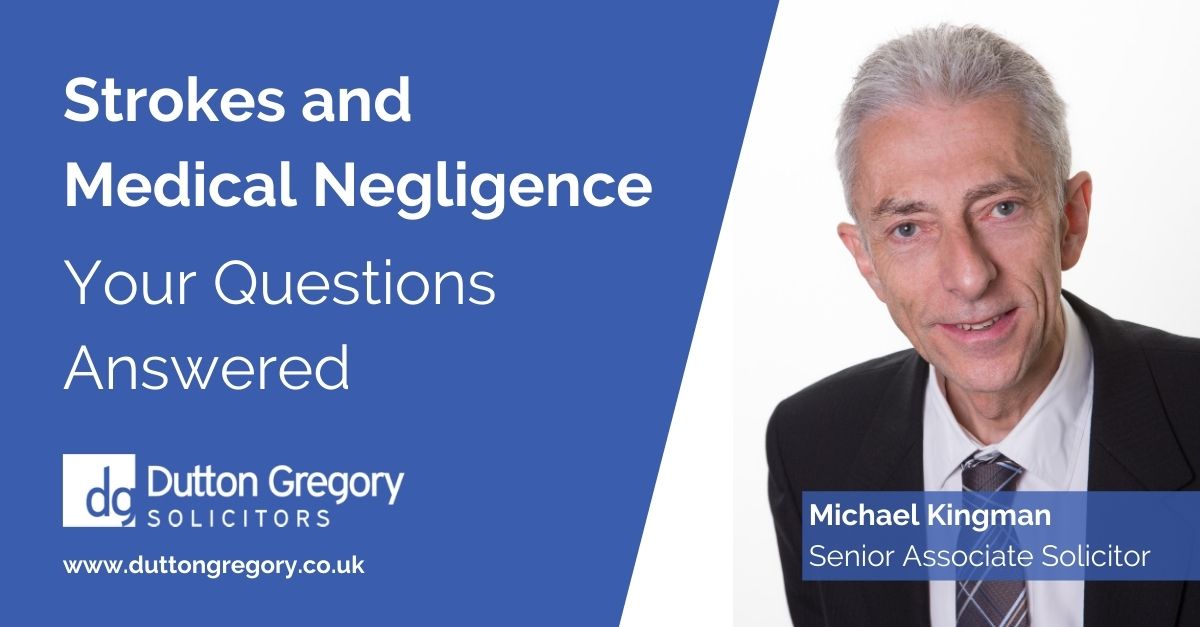Strokes can sometimes seriously impact an individual’s quality of life. If you believe it could have been prevented with better medical care, you may wish to make a compensation claim.
What is a stroke?
A stroke occurs when a blood vessel that carries oxygen to the brain is either blocked by a clot or bursts. When that happens, brain cells die and may cause devastating physical injuries and there may be serious mental consequences for the individual.
Research has shown that, although the number of people in England dying from a stroke has fallen, there has been a worrying rise in people aged 35 to 54 who have suffered strokes. Research also suggests that increased levels of obesity may be behind this increase.
What are the symptoms of a stroke?
The symptoms of a stroke are often very clear and medical professionals will have a strong suspicion that a patient has suffered a stroke based on these signs.
I’m sure we all know the government’s “Act FAST” campaign to educate the public on the signs of a stroke:
- Face – has their face fallen on one side? Can they smile?
- Arms – can they raise both arms and keep them there?
- Speech – is their speech slurred?
- Time to call 999 if you see any one of these signs
Time is of the essence when someone has suffered a stroke, particularly when associated with a blood clot. If the stroke is not treated promptly, damage to the brain can be extensive which can lead to permanent severe disability. Disabilities can include loss of speech, one sided physical impairment, loss of vision, memory loss and a reduction in cognitive functioning.
When may there be a possible clinical/medical negligence claim?
Although sometimes there may be a negligent delay in treating a stroke, most cases of negligence arise because the stroke itself could have been prevented.
Sometimes strokes can be misdiagnosed but most successful claims arise from showing that there was a missed opportunity to treat and stop a stroke from happening in the first place. If it can be shown that this was as a result of sub-standard medical treatment, there may be a claim for substantial compensation.
Negligence may arise by reason of:
- A failure to treat high blood pressure;
- A failure to provide clot-busting therapy;
- A delay in performing a scan;
- A delay in diagnosing a haemorrhage;
- A delay in surgical or medical treatment.
What should I do if I think my child/family member’s condition was caused by medical negligence?
If you suspect a clinical or medical mistake, we would advise that you speak to a specialist lawyer in the first instance to get advice on your individual case and look to bring a claim for compensation.
For instance, our team of lawyers have experience in handling stroke claims and may be able to assist you by investigating and bringing a claim forward. Our specialist expertise has seen us help many individuals and their families achieve successful claims.
What compensation could I receive?
Following a stroke, rehabilitation can help individuals improve both their physical and cognitive impairments. For example, intensive physiotherapy to improve one sided weakness or speech and language therapy to help restore some speech. The cost of such rehabilitation on a private basis can be included within the claim.
As part of any claim involving a brain injury, care needs, accommodation, transport needs and any other needs can be costed and added to the claim. This is in addition to any compensation owed due to any pain, suffering or emotional stressed caused.
Total compensation may be significant. In a claim that settled in 2014, a 41-year-old woman received £735,000 for left-sided paralysis which arose because her GP failed to make a referral to a neurologist in September 2009.
She suffered a stroke and the resulting paralysis left her with a virtually useless left hand. She had visited her doctor complaining of a persistent headache and heaviness in her left arm. The doctor diagnosed migraine and prescribed painkillers. Some weeks later, she experienced weakness in her left side and a numb lip. Her doctor then suspected diabetes. 10 days later, she suffered a stroke. The doctor admitted negligence.
How can I speak to a lawyer about my claim?
You can contact our team for a confidential, non-committed, free initial advice on your case and how we can help you.
Contact us for free on 0800 5999 999 or email contact@duttongregory.co.uk.








